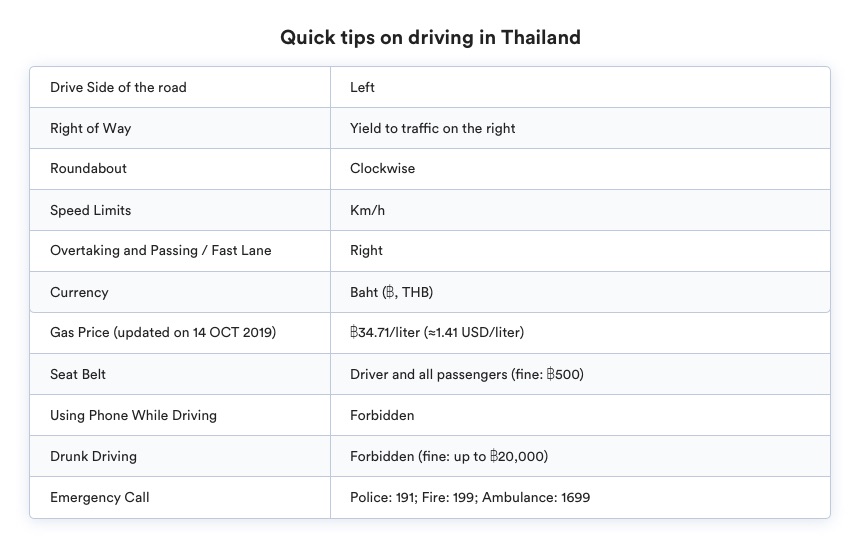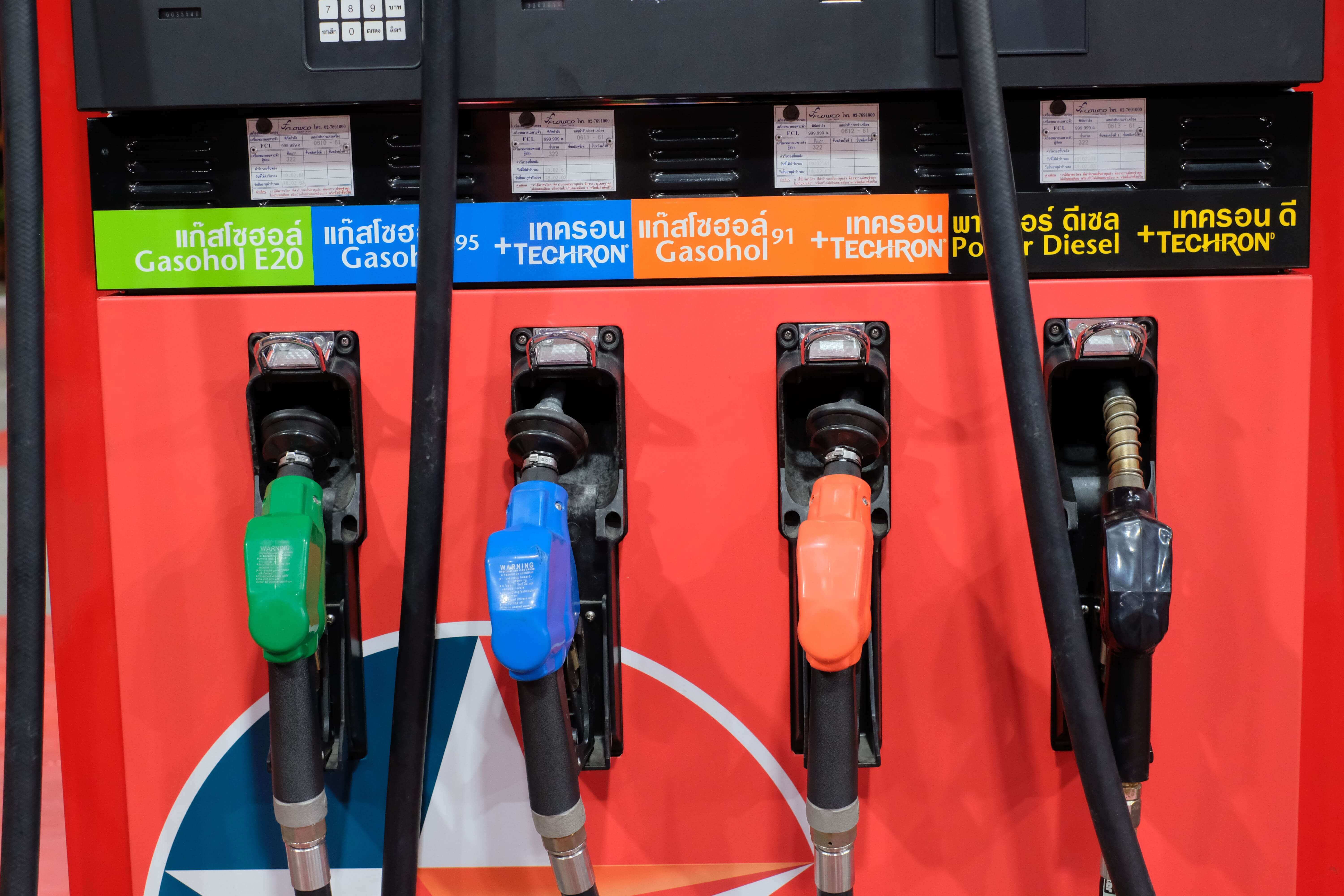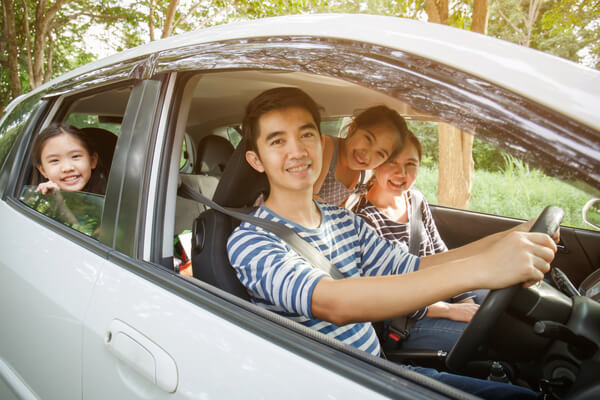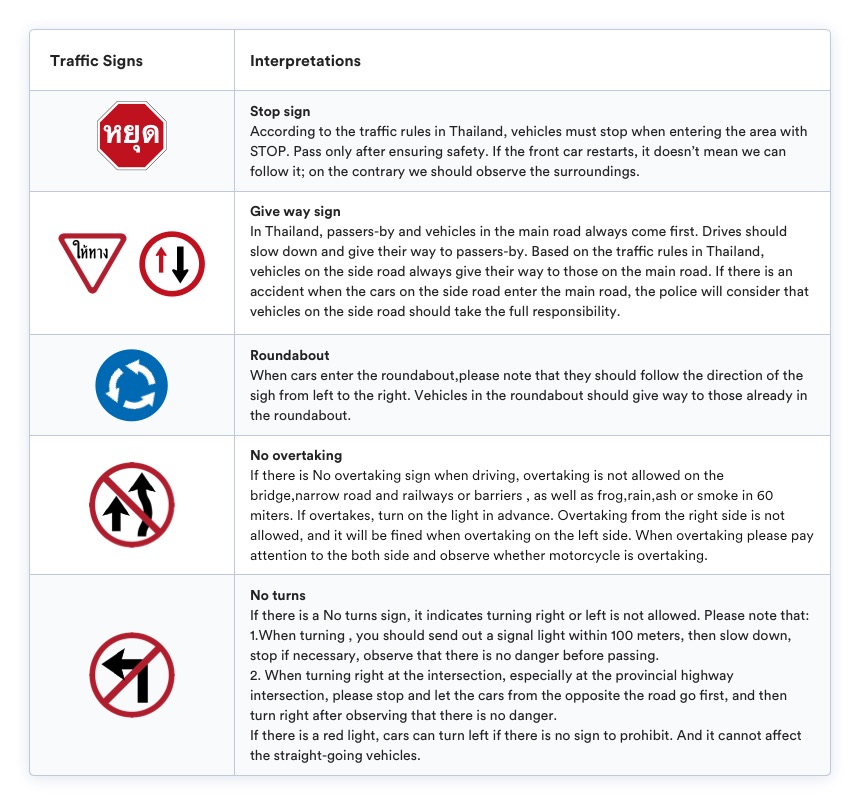Thailand is a well-known tourist attraction with charming tropical scenery and world-famous, extensive and profound Buddhism culture. And every year it attracts countless self-drivers here to travel.
1. Driving Rules and Tips
- Speed Limit
In Thailand, speed limits vary from regions to regions, kilometers per hour, consistent with the dial. Generally speaking, the general speed limit in the residential business district is 40-80 km/h, and 90-100 km/h on highways (and normally can not exceed 120 km/h). The general fine varies from 500 baht to 1000 baht for over speeding.
- Traffic signs
2. Road Condition and Toll Roads
- Road Condition
At present, the total length of the Thai highway is about 100,000 km, which is divided into three levels: national roads, public roads, and country roads. Despite a large number of roads in Thailand, the traffic in the city center is relatively crowded due to a large number of cars.
The Thai road is well developed and the road network covers all parts of the country. Most of the asphalt national roads are flat. However, there are many mountain roads in Pai – a small town in the north of Thailand, and drivers need to be more cautious.
- Toll Roads
There are toll highways from Bangkok to Pattaya, and other roads are free of charge. It is recommended to check if there is a toll road during the trip in advance to avoid the toll fee.
There are 3 ways to pay on the highways:
Bangna-trat: charge based on mileage
Motorway: charge based on stations
Express road: charge based on stations
Only the express roads in Grand Man Valley require electronic payment, and cash can be used for the rest, with a general charge of 40 baht-50 baht.
How to pay
Thailand’s highways toll station is divided into the fast channel and manual toll channel, cash, and electronic payment accepted. The expressway on highways Easy pass, can pay electronically after processing the high-speed card. If there is no electronic charging device (automatic fee charge), do not go to the Easy pass lane with blue marking on the ground, otherwise, additional fines or administrative fees will be incurred. It is recommended to use manual toll channels.
3. Gas
National gas price is connected with the international gas price, with 34.71 baht. Diesel is cheaper.
Gasoline in Thailand is divided into 4 types. No.91 gasoline (10% ethanol), green pump. E20 gasoline (20% ethanol), light green pump. No.95 gasoline (10% ethanol), orange pump. No.95 gasoline (pure), yellow pump. Diesel is with a blue pump.

In Thai gas stations, fuel types will be marked by Thai and numbers. If you don’t understand, you can check the mark on the back of the pump according to the sign in the stations, so you will not refuel with the wrong type. Be careful not to fill the tank with the wrong fuel. If you refuel with the wrong fuel, please contact the branch as soon as possible to clean up the fuel tank and the fuel system; and conduct an overall inspection of the engine. Don’t start the car in haste to avoid car damage.
Expert tips:
In most gas stations, staff will help refuel and wash the windshield. They are very considerate and friendly. And there are two more tips:
- It is suggested to refuel before the journey for the gas stations are not so many along the roads and resorts as well as the high price. There is no gas station on the highways, but stations must be set at the exit of the highways.
- Refuel the cars in well-known gas stations, such as Shell, Esso, Caltex, PPT. There will be a small board with “Gasoline”. It always refuels with tank and it is not adequate and pure. Besides the staff, English is not so good.
4. Parking
- Public parking
There are free parking lots in the center, shopping malls, and hotels. Most of the parking lots near the resorts are free and a few changes.
- On-street parking
Some roadside hotels can park free of charge, parking staff direct parking, but they will charge tips. In addition, a road marked with black and white stripes allows unlimited parking time, the area with yellow and white stripes allows temporarily parking.
Expert tips:
- Most parking in Thailand is paid manually.
- It is recommended to plan the parking area in advance, which will save time in finding the parking place, and also reduce the parking fee.
- Do not leave your luggage in the car if no people take care of it after parking.
5. Tickets
The rental company may pay the fine for you if there is an unknown fine when coming back. But usually, it is more expensive than the fee for breaking rules, which is included administration fee from the rental company.
If you receive tickets in Thailand, you have to pay the fine at the police office, or ask the car rental company to pay for you. If you don’t pay the fine, the fine will be higher. If there is no violation record during the rental, the deposit will be unfrozen and returned to the credit card of the main driver within a month.
Expert tips: It’s better to know whether there are toll roads or toll bridges and any possible illegal behaviors in advance. It would be better to pay the fine as soon as possible in case of a high overdue fine.
Visit QEEQ.COM now.
QEEQ.COM guarantees the most competitive car rental deals for your travel and the secret is our Price Drop Protector program! We can automatically track your rental rates and RE-BOOK you if prices drop! See how our customers love this feature here.



